Share
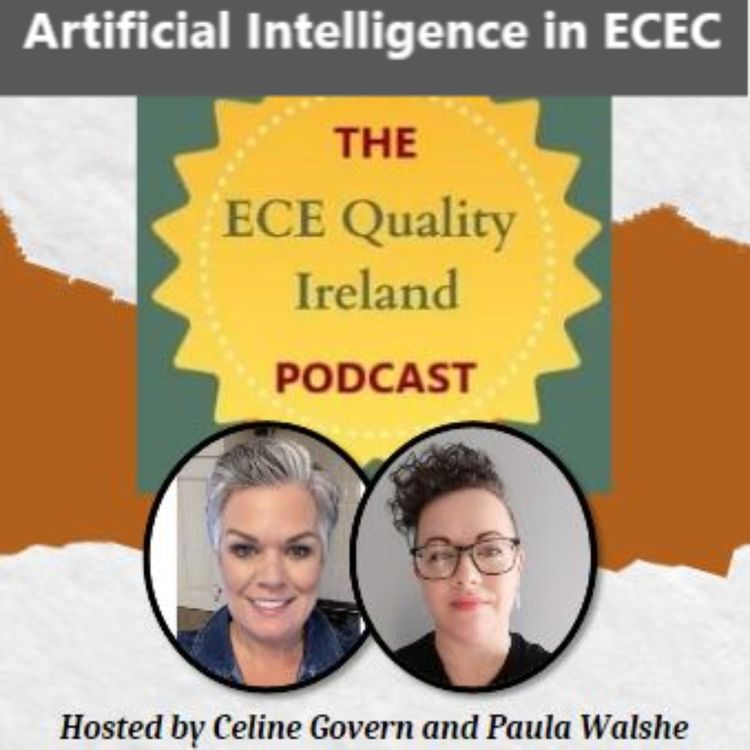
The ECE Quality Ireland Podcast
S2Ep5: Is there a Role for Artificial Intelligence in Early Childhood Education?
In this episode we discuss the possibilities and pitfalls for using artificial intelligence (AI) as a tool in early childhood education and care. We think about how AI could potentially save us precious time on planning and documentation, the possibility of using facial recognition for parent or child access to the building or calculating our attendance and fees as well as utilising AI for developing our knowledge to facilitate emergent interests. We also acknowledge the risks and issues that AI could bring and why it is really important for us as educators to be knowledgeable and prepared as a gatekeeper for issues such as GDPR, online safety, developmentally appropriate practice, reliable information and ethical decision making so that we can engage with this area as it becomes embedded in education and wider society in the decades to come.
More episodes
View all episodes
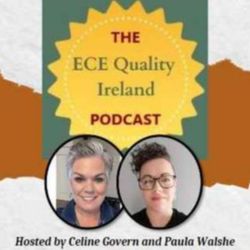
3. S6Ep3: Erasmus in Norway
01:00:57||Season 6, Ep. 3We are joined by Eileanóir Malone, an ECEC student educator who tells us all about her experience on Erasmus. She visited Norway and engaged in placement in a Norwegian ECEC setting. We always hear about how the Norwegian approach is the way to go in terms of best practice...but what is it really like? Hear all about it from a student who has experienced it, what did she learn, how did it influence studies and her professional practice and how are we measuring up in Ireland in comparison?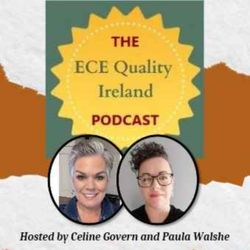
2. S6Ep2: Early Literacy, eTwinning and Nativity Plays
01:07:25||Season 6, Ep. 2In this episode we chat about the importance of early literacy and Celine's trip to a literacy conference, Paula's experience at an eTwinning seminar in Cyprus for promoting active citizenship in early childhood and the timely topic of nativity plays in early childhood settings at Christmas...do we do them or not?
1. S6Ep1: Changes - New Aistear, New Pay, New Department
43:02||Season 6, Ep. 1In this first episode of Season 6 we catch up on all the changes affecting ECEC in Ireland over the last few months. A newly updated Aistear curriculum framework is live, new ERO mandatory pay rates for educators and a new government department and minister. Celine has opened 2 more ECEC settings bringing her total to 5 and Paula is heading to Cyprus on an eTwinning trip and to Brussels to fly the flag for STEM/STEAM in ECEC. So much to talk about! Listen in and share. It's going to be a great season!
9. S5Ep9: Poo and the Loo - Potty training for preschool
56:36||Season 5, Ep. 9All things poo and potty training for starting preschool! In this super interesting episode we delve into the world of poo and potty training with registered nurse Ann Costigan of 'Poo and the Loo' on Instagram. Ann shares a wealth of professional and practical knowledge about the right time to potty train, if we should use pull ups or not, her top tips for successful potty training and what to do if your child is constipated or having difficulty pooing. This podcast episode is sure to be of great interest to parents/caregivers and early childhood educators alike in anticipation of potty training children in advance of starting their preschool year in September.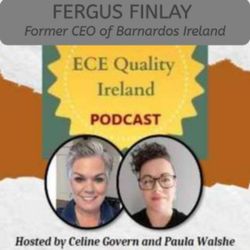
8. S5Ep8: Fergus Finlay - Former CEO of Barnardos Ireland
01:08:05||Season 5, Ep. 8We chat with Fergus Finlay, former CEO of Barnardos Ireland and columnist with the Irish Examiner about a vast array of topics including diversity, equity and inclusion, the importance of early intervention and investing in quality early childhood education. Fergus gives us insight into his homemade brown bread and we also ask him if he might consider running in the upcoming Presidential election later in 2025.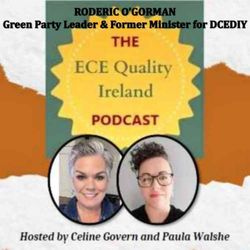
7. S5Ep7: Roderic O'Gorman on Early Childhood Education
39:58||Season 5, Ep. 7Current Leader of the Green Party and former Minister for the DCEDIY, Roderic O'Gorman TD joins us on the podcast! We have a great discussion with Roderic about his time as the Minister of the Department with responsibility for the ECEC sector and his early childhood experiences which shaped him as a future member and leader of the Green Party. We also ask Roderic some important questions about recent issues impacting the ECEC sector such as professionalisation and terminology, funding, plans for a public system and the change of the sector name from ECEC to ELC. This was such an insightful and interesting chat.......we hope you enjoy it!
6. S5Ep6: Inspection - The EY Education Focused Inspection
53:21||Season 5, Ep. 6In this episode we discuss the call that makes all educators nervous - the notification of the inspection calling. We discuss the education focused inspection carried out by the Department of Education and we go through the EYEI inspection guideline document. We finish up with some practical tips and key takeaways which feedback from recent inspections have highlighted as important for you to consider in your practice.
5. S5Ep5: Quality School Aged-Childcare and the Importance of Play
39:49||Season 4, Ep. 5We chat with Shelly McGee who is the Quality Support Specialist for School-Aged-Childcare and Play with National Childhood Network (NCN). We discuss what school-aged childcare and afterschool care is, how to support quality and play for children in SAC and how to ensure that children in SAC are supported, valued and their voice is heard.
4. S5Ep4: New Aistear! - An Analysis of the new ECEC Framework
43:18||Season 5, Ep. 4On 5th of December 2024 the eagerly awaited updated version of Aistear, the early childhood curriculum framework in Ireland, was published online by the NCCA. In this episode, we discuss the main changes to the new framework and whether or not the updates are a 'big tick' for us or not. Have a listen and find out what we think.